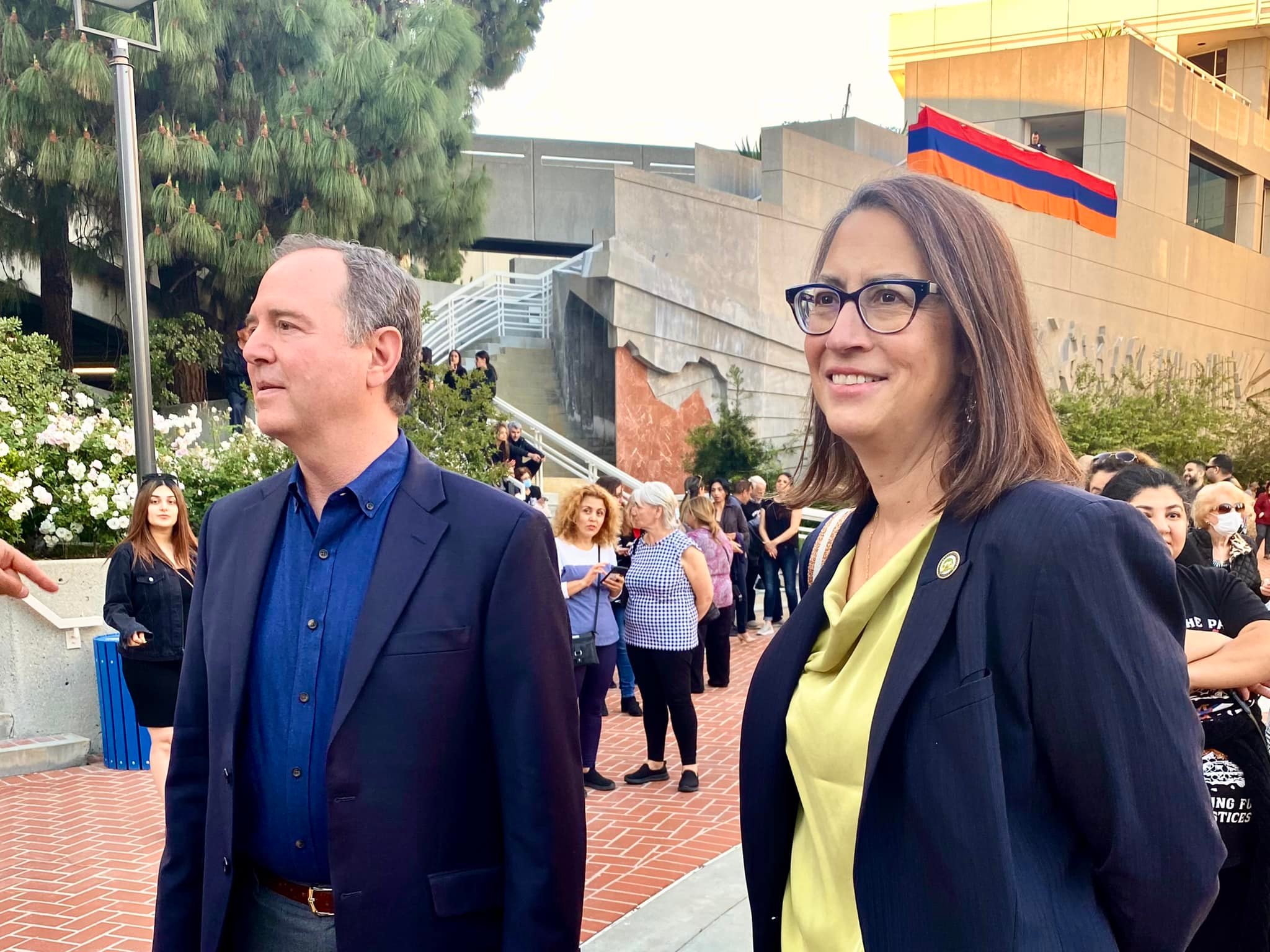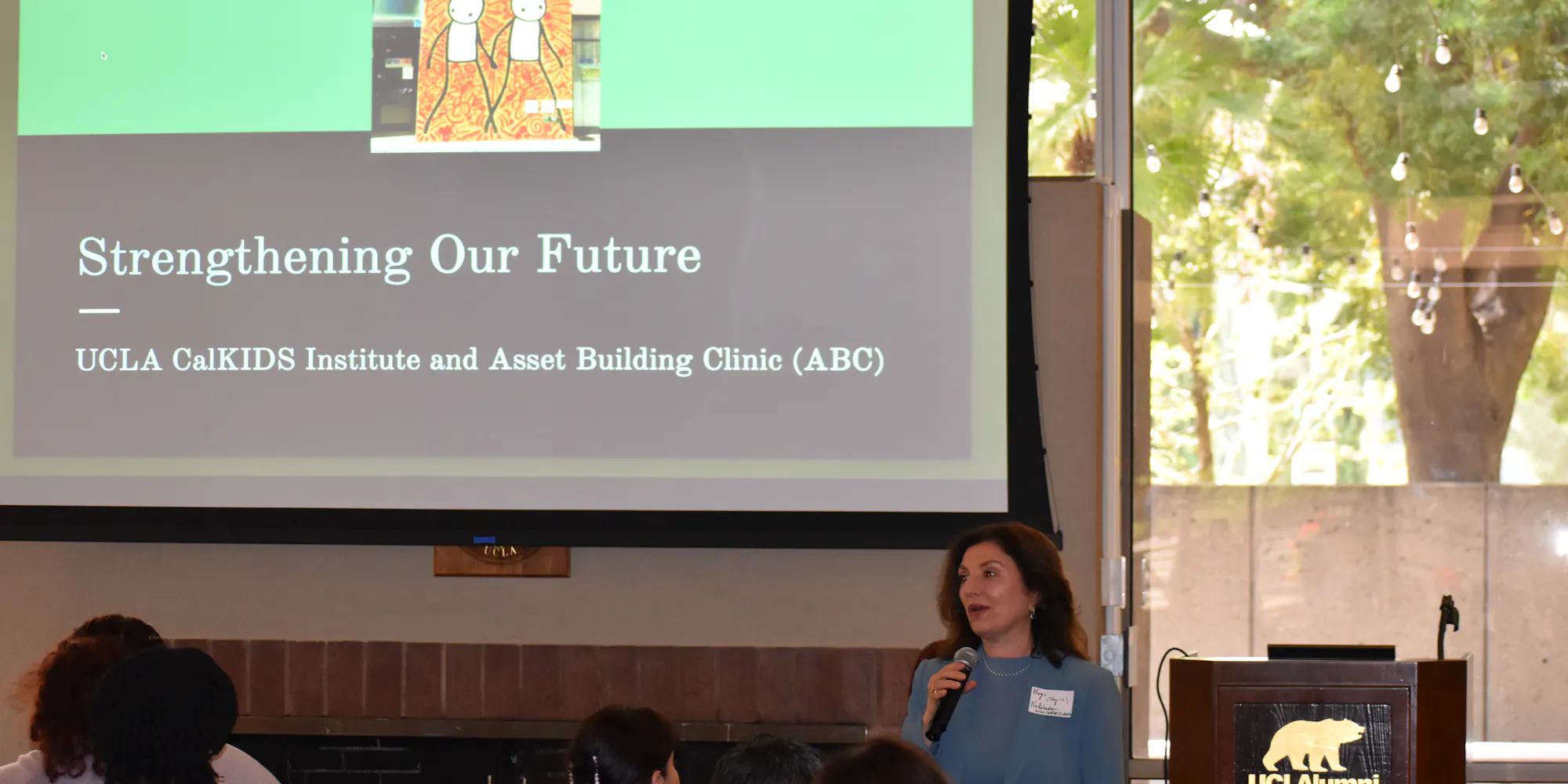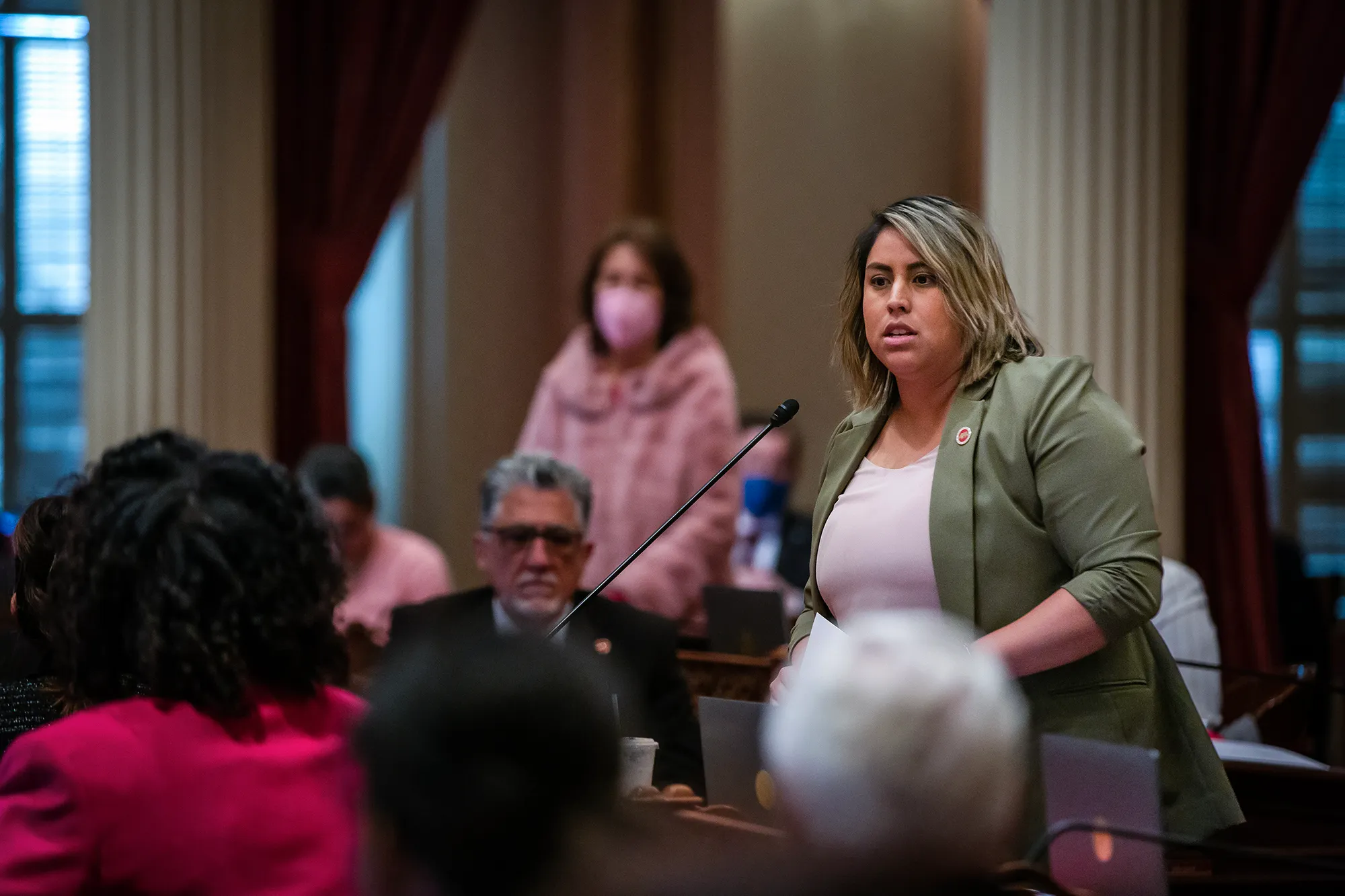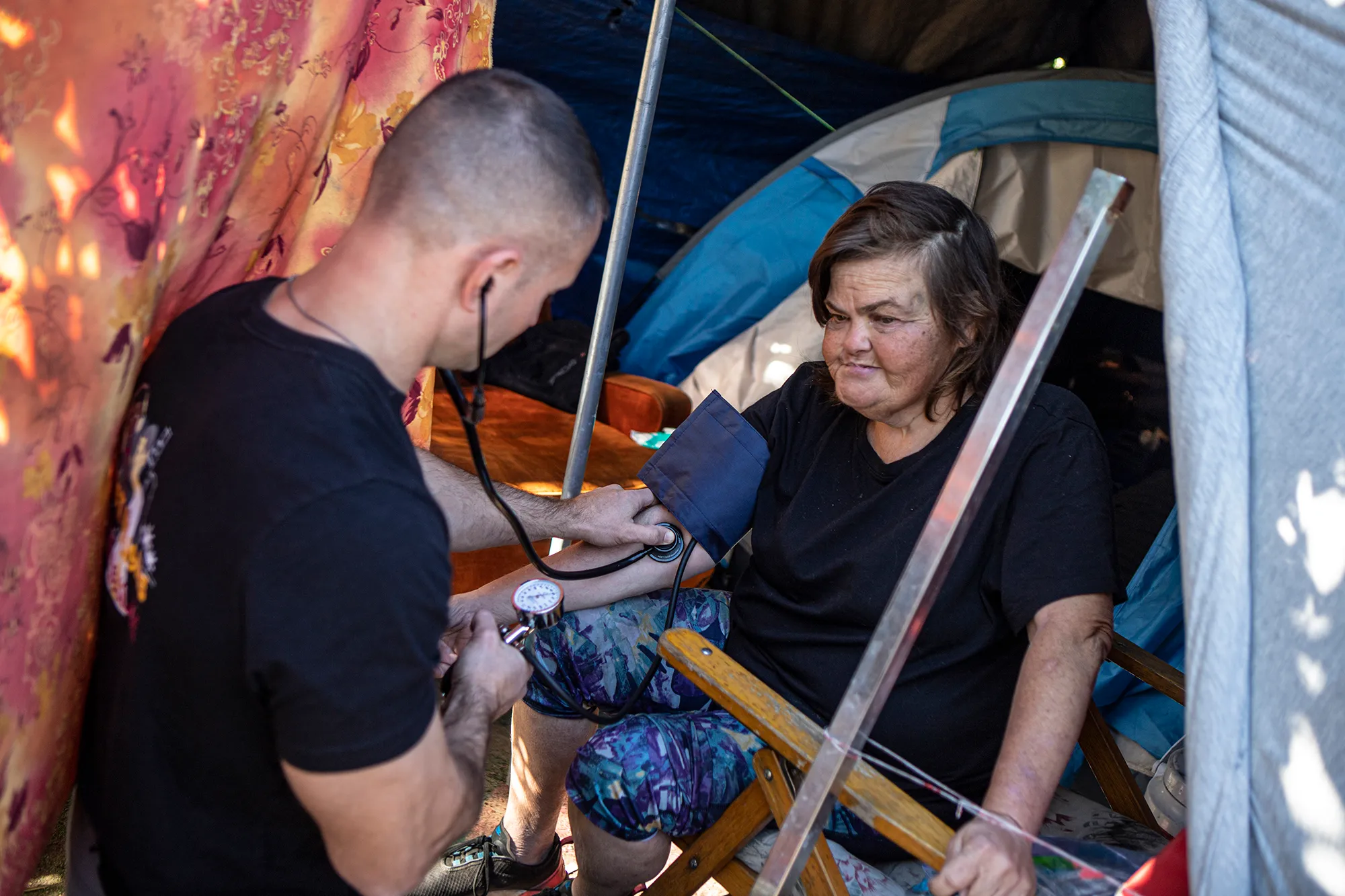Years of Service Spring Laura Friedman Closer to Congress
“I never ran with the intention of being ‘Adam Schiff Part Two,”’ says Friedman. “Will I stand up and defend democracy? Of course. Will I do what I can to prevent a Trump presidency? Absolutely. But I don’t see myself playing the same role as Adam Schiff.”
By Brandon Ross Garcia
WeHoOnline.com
There’s a saying in pool halls that goes: “Play the table, not your opponent.”
So while state Sen. Anthony Portantino, former L.A. City Attorney Mike Feuer and actor Ben Savage were competing to be the top fundraiser in the race for California’s 30th Congressional District, Assemblymember Laura Friedman kept cool, calm and collected.
Friedman focused on her message, showing voters who she is and what she has done in creative ways, such as the smart TV spot that revealed her skills in the billiard room.
In the March 4 California primary, she staged an upset victory in the primary election that surprised many who were watching.
“I was really nervous going into Election Night,” Friedman told WEHOonline over coffee at The Arden in West Hollywood. “I wanted to just go home and watch the returns in bed, but my team felt it was important that we do something a bit more public and invite our supporters to come. In hindsight, I’m really glad we did because it turned into quite a celebration.”
Friedman didn’t feel her opponents’ financial edge was an obstacle she couldn’t overcome.
“I never believe in the conventional wisdom that the person who raises the most money is always going to win,” she said. “We’ve seen that not happen in the L.A. mayor’s race, in the supervisor’s race in WeHo last time, and in my race. It’s no longer the case that you can buy elections.”
She might have lagged behind four of her opponents in terms of total funds raised, but her campaign received the most individual contributions in the district, a testament to the breadth of her support.
Her victory in the primary, she believes, was the cumulative result of many years of service to the community.
“The body of work that I have focused on in the legislature, and as a City Council member as well, was the genesis of the identity that I was able to build on in the district,” she said. “So, when I would go into parts of the district that didn’t know me as well, I was able to point to real things that I have done, right next to them.
“Being known by the activists, by people who pay attention to policy in Los Angeles, I think that was more germane to the victory than any campaign strategy.”
This campaign for Congress is Friedman’s first foray into politics outside the greater Glendale/Burbank area, a career that began with her election to Glendale City Council in 2009 and continued when she became a member of the California Assembly, a role in which she has served since 2016.
Her victory last month means she’ll compete in the runoff election this coming November to lead the district long represented by U.S. Rep. Adam Schiff — an area which includes West Hollywood, Echo Park, Larchmont Village, Los Feliz, Mid-Wilshire, Miracle Mile and Silver Lake, in addition to her home turf.
As she met voters in these new neighborhoods, she was struck by how heavily crime weighed on their minds — and how tired of polarizing politics they were.
“Although we’re a very progressive district, and primarily a progressive Democratic district, there’s also a very strong desire, even among progressive people, to not compromise on our values but also to have a functional federal government,” Friedman said.
“So, there’s a bit of a disconnect there. We want our progressive values, and we want the government to enact our progressive values, but we also don’t want the fighting with right-wingers anymore.
“Everybody wants the government to work. So, how do you find a way to uphold your values and be a Democrat, yet still work across the aisle to get things done? That question came up over and over again.”
Friedman has had success working with Republicans in the Assembly, many of whom have co-authored bills with her, but she realizes that it’s often because, as a minority party, they have no choice but to cooperate.
As a member of perennially divided Congress, getting things done could be more difficult for her should she prevail in November– especially if the GOP keeps their majority in the House.
The 30th District is one of the bluest places in the country. California’s jungle primary system sends the top two vote getters overall to the general election — not the top Democrat and the top Republican — which should all but guarantee the district stays blue. But that’s not what happened this time.
Adam Schiff’s successful strategy to promote his Republican opponent Steve Garvey over fellow Democrat Katie Porter into the runoff race for U.S. Senate appears to have helped GOP candidates in down ballot races throughout the state, including in his own district.
Friedman will face a Republican opponent in November: Dr. Alex Balekian, also from Glendale.
“His results tracked very closely with the Republican registration in the district and the fact that it was a high turnout,” Friedman said. “Across the state, Republicans turned out at a higher percentage than Democrats, which we saw in many districts, including mine in the 44th Assembly District.
“This outcome is mathematically very possible but doesn’t always happen because often, Republicans don’t vote in big numbers. This time, they did.”
Friedman believes voters in the district have a clear choice to make in November between her and her opponent.
“The first endorsement that I saw my opponent make after the primary was a group called Gays Against Groomers,” Friedman said. “He’s got this whole fantasy that our public schools are just these hotbeds for pedophilia — teachers trying to groom kids to be gay and trans.
“My daughter’s in public school in Glendale, and this is absolutely not happening. He was part of the riot at our school board meeting last June when they tried to do a resolution to acknowledge and celebrate Pride Month.
“I’m very much adamant that we do have curriculum that represents everybody, you know, all the experiences of all our children, whatever they are exploring, their gender identity, exploring their sexuality. I think we need to prepare them for that, for what they’re going to face in the world, and not demonize kids who are transgender or kids who are LGBT.”
Friedman is looking forward to flying the flag for the LGBTQ community and for West Hollywood as its future congresswoman.
“WeHo is a really special place,” she said. “I feel a profound sense of the gravity of the position that I’m taking on. You know, Adam (Schiff) was such a huge luminary on the political scene — he was able to do the work that he did because of who he is, but also because we have a district that is very politically aware.
“We have a district of activists. That’s what this district is, and so it’s always going to be a district that demands a lot from their elected officials. My biggest worry is just being up to the task, quite honestly. I want to make my district proud. I want everyone who voted for me to tell me in two years that they’re happy they voted for me.”
Adam Schiff positioned himself as a nemesis of President Trump. If he wins a second term, would you assume a similar role?
“I never ran with the intention of being ‘Adam Schiff Part Two.’ There were candidates in my race who were more deliberate in stating that’s what they wanted to do. I’m not a lawyer, I’m not a prosecutor, and I don’t have Adam Schiff’s background. I respect the role he played. Will I stand up and defend democracy? Of course. Will I do what I can to prevent a Trump presidency? Absolutely. But I don’t see myself playing the same role as Adam Schiff.”
Did the LA Times endorsement help you?
“I don’t know. I was really proud of it. They’re a very tough audience. They ask very hard questions. It’s a whole big group of their editorial staff. They’re incredibly knowledgeable. They knew a lot about my work. They knew a lot about policy. And then I know that they called a lot of people in the community and asked them about the candidates. I was getting reports that they had been called by the LA Times. So, I didn’t know. I really thought that I didn’t do well in the interview. I was nervous. And so, I was really thrilled when I saw the endorsement. And I’ve got to think that it would help, to some extent. To what extent, I don’t know.”
Have you met Patrick Soon-Shiong, the owner of the L.A. Times, or his daughter Nika?
“No, never.”
How often did Israel come up on the trail?
“It came up quite a bit, particularly when we were doing phone calls and voter outreach to younger voters. So, it came up less in living rooms, quite honestly. I think we heard back less. It came up occasionally. We definitely heard questions about it from different people with different perspectives. We also heard from people, particularly as time went by, a real negative reaction to having people ask questions about it. We definitely heard from community members who felt that it was very divisive, that we didn’t really have much input here in Los Angeles. Yeah, they were sick of it dominating the political discourse. They felt that it was very divisive on the left or in Democratic circles, that it was pushing people into corners, it was dividing families, and they were just kind of like, ‘We don’t want it to become the topic when, you know, when they had other things.”
WeHo has a love-hate relationship with scooters. How do you think they can be integrated into mainstream transportation?
“Look, micro-mobility is incredibly important, especially in a dense area like WeHo. You know, everyone that’s on a scooter or bicycle is not in a car. So, you know, this is really important, and what I’ve been advocating for a very long time is that cities are open to these solutions, but also make them safe for people and remove them from traffic as best they can, so that people are safer that are using micro-mobility, that they understand the rules, that we have similar rules all around LA, so that it’s not one rule in Beverly Hills and one rule in WeHo. That doesn’t work for people, and that they create the infrastructure to have safety for people that are using them, and so that they’re not a nuisance for cars or people on sidewalks.”
What would you tell the people who are losing their parking spots in order to accommodate bike lanes and other non-vehicle infrastructure?
“Well, I would say a few things. First of all, if you have a lot of people on bikes, it’s a lot of people not looking for parking spaces. So, let’s not forget that if you’re actually replacing cars with people on bike trips, you don’t need that space. There are cities that have done bike corrals, you know, where they’ll take one space, you can make like 15 parking spaces in one space, and if you’re talking about removing an entire row of parking for a bike lane, you’re probably not getting as many cars in that one row of one side of a street as you think. You’re getting if you count up the number of cars, you’re probably looking at 15, 20 cars, and cities have the ability to do public lots. They can do a better job of managing parking of existing parking spaces that are in commercial buildings, for instance, which often are not being used at night.”
Your bill allowed new developments to have less parking in order to house more people. How does that work in WeHo, where neighbors depend on street parking?
“The idea is that you’ve got people here in WeHo who don’t own a car. It’s very hard to find housing with a parking need. Coupled with that, they’re paying for a spot whether they use it or not. So, giving them a chance to pay for a cheaper unit without parking allows for them to have housing. And at the end of the day, we have a lot more space, square footage for cars than we do for humans.
“If you look at the square footage that we have for parking, it’s more than the square footage we’ve given people to live in, and that’s not right. It’s not every building. It can only be near high-quality transit, they have to have a certain amount of affordability, and cities are encouraged to employ parking management strategies. What we really want is for cities to build more transit and to offer people car-free living if they’re going to be living in a building with no cars.
“Other cities absolutely do that with success. My sister lives in Brookline, Massachusetts, and in Boston, a lot of people don’t own cars. There, they live in buildings without cars. New York City, a lot of Boston, San Francisco, San Diego, Buffalo, New York, there’s a lot of cities that have already done this kind of parking regulations. Buffalo, the whole city, doesn’t have a parking requirement. San Diego, all of downtown San Diego.
“And what they see is more affordable housing, for sure. San Diego had a four times increase in affordable housing builds after they removed parking minimums, and more people who just don’t own cars. It works, but the cities do have to make sure that they commit to the transit, to the bike lanes, to giving people an option where they don’t have to then have a car that they can’t have a place to park. Some cities have public lots or invest more in public lots in these areas. So, there are options.”
What about Waymo and autonomous vehicles. Is that the future?
“Waymo is also an option. There’s been a lot of talk about when we have more autonomous vehicles, people aren’t going to own them; they’re going to be fleet. It’s cheaper to take Uber around than it is to buy, insure a car, and park it. So more and more young people are doing that, and I think people have to recognize that a lot of people that are going into these buildings are choosing not to own oroperate a car. It’s cheaper for them not to. Waymo will be another option.”
What do you think about Joe Biden? Is there a better choice?
“He’s our choice. I think he’s been a great president. I’m not saying this because he’s the guy in the White House, but his presidency has surprised me. It’s super enviro, given the fact that he’s dealing with a Republican-led House.
“He’s done Build Back Better, which has some of the best clean energy incentives we’ve ever seen, the best clean energy incentives we’ve ever seen, really game-changing work around clean energy generation. He’s been pushing the needle on everything that he can in a really difficult political environment, so he’s been much more progressive than I ever thought he was going to be. Any Democrat’s going to get a lot of flak from Republicans.
“They’re going to throw whatever they can at them, whether Hunter’s laptop, or Hillary’s server. Like, we’re just in an era where everyone’s going to be put through the ringer. You know, if it was Gavin Newsom, it would be whatever he’s done, whatever they throw at him. So, there’s not going to be some perfect candidate that all of a sudden is going to win the hearts and minds of every Republican out there either. I think he’s been a great president. He fully has my support.”
Brandon Ross Garcia is editor and managing director of WEHOonline.com. He can be reached at brandon@wehoonline.com
Published with permission of wehoonline.com













